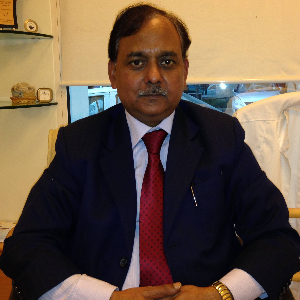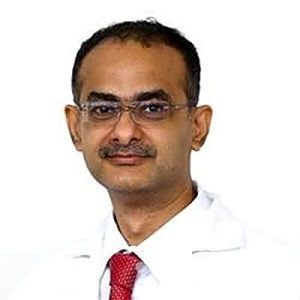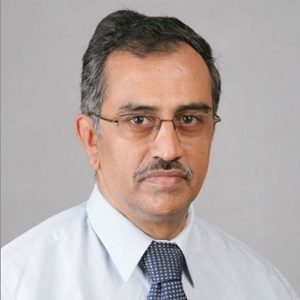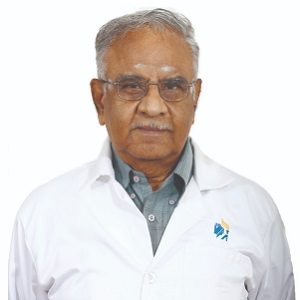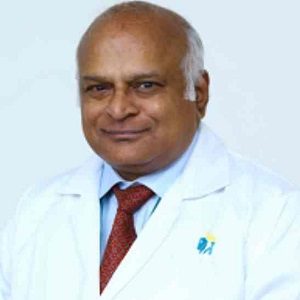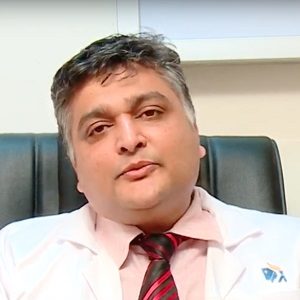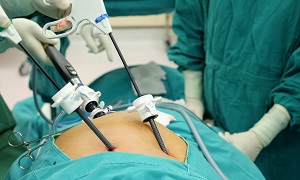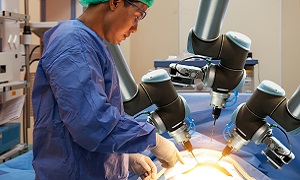Best Doctors in India for Cystectomy Surgery
- Urologist, New Delhi, India
- Over 20 years’ experience
Profile Highlights:
- Dr. Sanjay Gogoi is a renowned Urologist with over 20 years of experience, He is an expert in minimally invasive transplant techniques of Laparoscopic and Robotic-Assisted Transplantation.
- He is also trained in Robotic surgery at da Vinci Training Center, Intuitive Surgical, California. With over six years of experience in doing Robotic Cancer surgeries on the Kidney, Bladder, Prostate, Adrenal, etc., Dr. Sanjay Gogoi is an expert in Robotic reconstructive procedures of kidneys, ureters, and bladder, as well, as in adults as well as pediatric patients.
- Urologist, New Delhi, India
- Over 35 years’ experience
Profile Highlights:
- Dr. Anant Kumar is one of the finest urology and kidney transplant doctors in India.
- Dr. Kumar specializes in Kidney Transplantation, Robotic Assisted Laparoscopic Urology, Renovascular Hypertension, Laparoscopic Urology, Urological Oncology, Laser Urological Surgery, and Reconstructive Urology.
- He has performed over 3500 kidney transplants and over 2000 lap donor nephrectomy procedures over the span of 3 decades.
- Nephrologist, Gurugram, India
- Over 15 years’ experience
Profile Highlights:
- Known as one of the best nephrologists in the NCR region, Dr. Manish Jain holds a special interest in renal transplants as well as clinical nephrology.
- His compassionate patient care and lifestyle advocacy have helped patients recover from various disorders.
- Throughout his career, Dr. Manish Jain has published several papers in India and is also a member of several medical associations.
- Urologist, Chennai, India
- Over 15 years’ experience
Profile Highlights:
- Dr. Deepak Raghavan is a renowned urologist who has gained immense fame and praise in the few years of his career.
- He is specially trained in Robotic Surgery, the need of the hour for Urology patients.
- Pediatric Urologist, Chennai, India
- Over 25 years’ experience
Profile Highlights:
- Dr. Sripathi is a renowned surgeon with 25 years of experience in the field of Pediatric Urology.
- Dr. V Sripathi qualified for the award of the “Fellowship of the Royal Australasian College of Surgeons” (FRACS) after working in Perth and Melbourne, Australia.
- He completed his Pediatric Urology training with a brief stint at the King Faisal Specialist Hospital & Research Center in Riyadh, specializing in advanced Reconstructive Urology.
- Urologist, Chennai, India
- Over 45 years’ experience
Profile Highlights:
- Dr. Duraisamy S is one of the best Urology surgeons and General physicians in South India with more than 45 years of experience.
- Dr. Duraisamy considers his profession a special mission, a devotion that calls for involvement, respect, and willingness to help others.
- He published several papers on UTI, uterovaginal fistula, ureteric diverticulum, and Endoscopy in reputed medical periodicals.
- Urologist, Chennai, India
- Over 39 years’ experience
Profile Highlights:
- Dr. Murali Venkatraman is a Senior Urologist from India with vast experience.
- Being a fellowship holder in Laparoscopic Urology, he specializes in Laparoscopic Urology.
- Dr. Venkataraman is serving for the last 39 years and has received many awards and recognitions for his contribution.
- Urologist, Chennai, India
- Over 37 years’ experience
Profile Highlights:
- Dr. Thirumalai Ganesan Govindasamy is a well-known Urologist of India.
- He has interests and specializations in Laparoscopic and Robotic Urology, Robotic and Laparoscopic Donor Nephrectomy, Urethral Reconstructive Surgery, Per-cutaneous Nephrolithotomy, and Flexible Ureteroscopy.
- Serving his patients for almost 37 years, Dr. Govindasamy has gained enough recognition and trust from his patients and has cured many people of severe illnesses.
- Urologist, Chennai, India
- Over 21 years’ experience
Profile Highlights:
- Dr. Nitesh Jain is an experienced urologist in Tamil Nadu, having managed complex urological diseases.
- Dr. Nitesh has grabbed a gold medal in Surgery during MBBS and M.Ch Urology.
- Dr. Nitesh Jain also got training in robotic surgery from Roswell Park Cancer Institute, Buffalo, USA.
Best Hospitals in India for Cystectomy Surgery
Fortis Hiranandani Hospital, Mumbai
- City: Mumbai, India
Hospital Highlights:
- Fortis Hiranandani hospital was established in 2007.
- The hospital is an advanced tertiary care, multi-specialty hospital equipped with 149 beds.
- The hospital is equipped with a super ICU to provide emergency medical care to critically ill patients.
- The hospital is NABH accredited.
- The critical care facility in the hospital is augmented with the state-of-the-art facilities that facilitate speedier diagnosis and efficient monitoring.
- The hospital provides specialty medical services in cardiology, orthopedic science, pediatric science, neurology, diabetic care, urology, nephrology, ENT, obstetrics, gynecology, cosmetic surgery, bariatric surgery, neuro and spine care.
Fortis Hospital, Anandpur, Kolkata
- City: Kolkata, India
Hospital Highlights:
- Fortis Hospital, Anandapur, Kolkata is a world-class super-speciality equipped with the latest technologies in the medical world.
- The hospital is NABH accredited.
- This state-of-the-art facility specializes in cardiology and cardiac surgery, urology, nephrology, neurosciences, orthopaedics, digestive care, emergency care and critical care.
- The hospital, governed by integrated Building Management System (IBMS), has a pneumatic chute system, for quick vertical and horizontal transportation between floors, facilitating speedy transfer of patient specimens, documents, reports, and medicines to the concerned departments.
- The hospital also has a nephrology department with over 28 advanced dialysis units.
Fortis Hospital Banerghatta, Bengaluru
- City: Bengaluru, India
Hospital Highlights:
- Fortis Hospital Bannerghatta, Bengaluru was established in 2006.
- The hospital is a 276 bedded multi-specialty tertiary care facility.
- The hospital specializes in cutting-edge medical technology and dedicated patient care services.
- The hospital is equipped with state-of-the-art technologies like trans-radial angioplasty, trans-abdominal cardiac surgery, and computerized TKR navigation surgery.
- The hospital provides specialty medical services in cardiology, cardiac surgery, orthopedics, neurology, neuro-surgery, GI, and Minimal Access Surgery (MAS).
Fortis Hospital, Malar, Chennai
- City: Chennai, India
Hospital Highlights:
- Fortis Malar was established in 1992 and was formerly known as Malar Hospital.
- The hospital specializes in cutting-edge medical technology and dedicated patient care services.
- The hospital is multi-specialty, tertiary care facility with 180 beds.
- The hospital offers comprehensive medical care in specialties such as cardiology, cardio-thoracic surgery, neurology, neurosurgery, orthopedics, nephrology, gynecology, gastroenterology, urology, pediatrics, and diabetes.
Gleneagles Global Hospital, Parel, Mumbai
- City: Mumbai, India
Hospital Highlights:
- Gleneagles Global Hospital The 450-bed facility comprises of 17-stories, housing state-of-the-art infrastructure, and advanced medical care facilities.
- The hospital offers end-to-end clinical, surgical, and diagnostic services. It is equipped with a team of eminent medical professionals aided by qualified nurses and medical staff
- The Hospital offers advanced Endoscopic procedures, Hepatobiliary and Liver Surgeries, Surgical and Medical Gastroenterology, Bariatric Surgery, and Robotic surgery.
- The hospital is a center of excellence for Orthopedics, Joint Replacement, Knee Replacement, and Hip Replacement surgery.
Manipal Hospital, Dwarka, Delhi
- City: New Delhi, India
Hospital Highlights:
- Manipal Hospitals, Dwarka, is a super-specialty hospital in Dwarka, New Delhi, which is a part of Manipal Hospitals Group.
- The hospital aims to provide the best treatment on par with international standards at a fraction of the cost.
- Equipped with 380 beds, the hospital is also one of the new age hospitals which are equipped fully with state-of-the-art infrastructure, cutting-edge technology as well as the latest and advanced clinical practices. The hospital also has 13 modular Operation theatres with 118 beds which are solely meant for critical care.
- The hospital comprises internationally acclaimed doctors and highly professional and experienced hospital and medical staff who are able to provide preventive, therapeutic, and diagnostic services all under one roof.
Paras Hospital, Gurugram
- City: Gurugram, India
Hospital Highlights:
- Paras hospital was established in 2006 and is the 250 bedded flagship hospital of Paras Healthcare.
- The is supported by a team of doctors of international and national repute.
- The hospital is NABH accredited and also the first hospital in the region to have a NABL accredited laboratory.
- The hospital provides specialty medical services in around 55 departments including Neurosciences, Joint Replacement, Mother & Child Care, Minimal Invasive Surgery, Gynecology and Obstetrics, Ophthalmology, Dermatology, Endocrinology, Rheumatology, Cosmetic and Plastic surgery.
- The hospital is equipped with state-of-the-art technologies.
S L Raheja Hospital, Mahim, Mumbai
- City: Mumbai, India
Hospital Highlights:
- SL Raheja hospital is a 140-bed multi-specialty tertiary care hospital that is being managed by Fortis Healthcare Ltd.
- The hospital is a benchmark in healthcare and medical facilities in the neighborhood of Mahim & the western suburbs.
- L.Raheja Hospital, Mahim has one of the most effective ICU and Casualty care services.
- The hospital provides specialty medical services in Cardiology, Oncology, Neurology, Orthopedics, Mother & Child Care, and in Diabetes.
Wockhardt Hospitals, Mumbai
- City: Mumbai, India
Hospital Highlights:
- Wockhardt Hospitals were established in the year 1973, originally called First Hospitals and Heart Institute.
- Wockhardt Hospitals are super specialty health care networks in India, nurtured by Wockhardt Ltd, India’s 5th largest Pharmaceutical and Healthcare company.
- Wockhardt Hospitals is associated with Partners Harvard Medical International, an international arm of Harvard Medical School, USA.
- Wockhardt Heart Hospital performed India’s first endoscopic heart surgery.
- The hospital has a state-of-the-art infrastructure equipped with the latest technologies and modern equipment.
- It has special Centers of Excellence dedicated to the major specialties to provide hassle-free and high-quality clinical care.
Pushpawati Singhania Hospital & Research Institute, New Delhi
- City: New Delhi, India
Hospital Highlights:
- Established in 1996, Pushpawati Singhania Research Institute is one of the top hospitals in the NCR region, as well as one of the top facilities in India for gastroenterology. The hospital is one of South Asia’s first institutes in medical and surgical treatment for diseases related to digestion.
- The hospital is equipped with state-of-the art facilities coupled with the latest equipment as well as renowned consultants from various parts of India as well as other parts of the world.
CYSTECTOMY
Cystectomy, which is also known as bladder removal surgery, is a surgery for removing the urinary bladder. In men, having the entire bladder removed usually includes the removal of the prostate as well as seminal vesicles. In cases of women, cystectomy involves the removal of the uterus, ovaries, and parts of the vagina.
A surgeon needs to create a urinary diversion as well, after removing the bladder. This is to store urine and have it leave the body. There are several ways that urine can be stored as well as eliminated after removal of the bladder. Your doctor is able to decide which method is the best for you.
Cystectomy is generally performed for treating invasive or recurrent noninvasive bladder cancer. Cystectomy might also be performed for treating any kind of other pelvic tumors.
Purpose
Cystectomy can be performed for several reasons. Some of them include:
- Cancer that begins in the bladder or that begins nearby and grows to involve your bladder
- Birth defects affecting your urinary system
- Neurological or inflammatory disorders affecting your urinary system
The type of cystectomy and reconstruction that will be performed can depend on several factors, such as the reason for your surgery, your overall health, etc. You can discuss with your surgeon which procedure is best for you.
Preparation
Before your procedure, you will need to discuss with your doctor regarding any medicines that you take or whether you use any caffeine, alcohol, or any such drugs. You might also need to make changes to your medications, or avoid certain substances to help with your recovery after the surgery.
If you smoke, it is best to quit it before your surgery. Smoking is a risk factor for bladder cancer, and it also increases any risk of developing problems after the surgery.
After your surgery is scheduled, you are going to receive specific instructions on how you can prepare for it.
Procedure
Depending on your condition, your procedure can be of two types:
Partial cystectomy
In partial cystectomy, only a part of your bladder is removed. Usually, lymph nodes nearby are also removed to determine whether any cancer has spread beyond your bladder.
Radical cystectomy
In a radical cystectomy, surgeons remove your entire bladder and the lymph nodes near it. Surgeons generally almost always cut the vas deferens and remove any prostate and seminal vesicles. For women, doctors generally remove the uterus, fallopian tubes, ovaries, cervix, and in some cases, parts of the vaginal wall.
Ways of surgery
There are generally three ways in which the surgery might be performed:
Minimally invasive surgery
Open surgery
Robotic surgery
You will first receive general anesthesia that helps to keep you asleep throughout the surgery. Once you are asleep, the surgeon will be cutting into your abdomen. In the case of open surgery, there will be one large incision, while in the case of minimally invasive or robotic surgery, there will be several smaller incisions.
Next, your surgeons remove the bladder along with the lymph nodes nearby. Your surgeon might also need to remove other organs near the bladder including the urethra, prostate, and seminal vesicles in men. In cases of women, it includes the urethra, uterus, ovaries, and parts of the vagina.
After your bladder is removed, your surgeon will need to reconstruct the urinary tract so that urine can pass the body. This can be done in various ways.
- Ileal conduit- In this method, the surgeon disconnects a short portion of your small intestine known as the ileum. The ureters, i.e. the tubes carrying urine from the kidney to the bladder, are attached to one end of the ileum. The other end of the ileum can be attached to an opening in the skin which is known as a stoma. The stoma is generally located close to your belly button on your right side. For collecting urine, a plastic appliance, known as an ostomy bag is placed over the stoma.
- Continent cutaneous diversion- In this method, your surgeon creates a reservoir for storing urine from parts of your small and large intestine. The ureters are attached to one end of the reservoir. The other end of the reservoir is meanwhile connected to a small opening known as a stoma, in the skin of the abdomen. The reservoir is able to store urine and it needs to be emptied periodically by inserting a small drainage tube known as a catheter into the stoma. There is a need for an external bag.
- Neobladder- In this method, your surgeon uses a long piece of the small intestine for creating a reservoir for storing urine. These ureters are attached to one end of the reservoir, while the other end of the reservoir is connected to your urethra, the tube carrying the urine out of your body. You can empty your reservoir periodically by relaxing the pelvic muscles and tensing the abdominal muscles.
After the Procedure
You might require staying at the hospital for around five-six days after your surgery. This time is generally required so that your body is able to heal from the surgery. The intestines tend to be the last part to be awake after the surgery, and therefore you might need to be in the hospital until the intestines are again ready for absorbing fluids and nutrients.
On the day after the surgery, your healthcare team will likely have you get up and walk. Walking can help to promote healing and it can also help your bowel function to return. It improves your blood circulation as well and also prevents joint stiffness and blood clots.
You might also experience some pain or discomfort around the incision or incisions for some weeks after your surgery. As you continue to recovery, your pain is going to get better gradually. Before you get discharged from the hospital, you will need to talk with your doctor about medications and any other ways to improve your comfort.
It is also likely that you will be seeing mucus in your urine since the piece of intestine used in the procedure will still be making mucus like the intestines normally do. Over time, you will be seeing less mucus in your urine, though it is likely that it will never go away completely.
Few weeks after your surgery, you will likely need to return for follow-up appointments. Your doctor will check to make sure that your upper urinary tract drains adequately and you don’t experience any electrolyte imbalances.
If the cystectomy was performed for treating bladder cancer, your doctor will be recommending regular follow-up visits for checking for the recurrence of cancer.
During the first two months after the surgery, it is best if you can restrict some activities such as lifting, driving, bathing, and going back to your regular routine. Gradually, you will be regaining your strength, and your energy level will increase. You can also discuss with your doctor when it is safe to resume sexual activities.
Risks
Like all major surgical procedures, a cystectomy poses a few risks, which includes:
- Bleeding
- Blood clot infection
- Organ damage
- Reactions to anesthesia
It is likely that you will be seeing changes in how you urinate after any bladder surgery. Your bladder is smaller after partial cystectomy, and therefore you might need to go to the bathroom more often. If you have a radical cystectomy, your ability to urinate will be depending on the type of reconstructive surgery that you have.
For some men, bladder removal surgery can cause sexual side effects as well. Some men might experience difficulty getting and maintain erections. Also, men will not produce semen anymore, as the doctor removes the seminal vesicles along with the bladder.
Women can also experience some sexual side effects. Though intercourse is still possible, it can cause discomfort if doctors remove parts of the vagina. Some women can also have nerve damage, and this damage can limit a woman’s ability to become aroused and have an orgasm.


